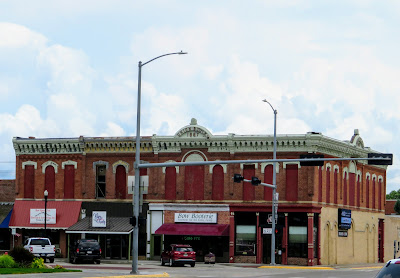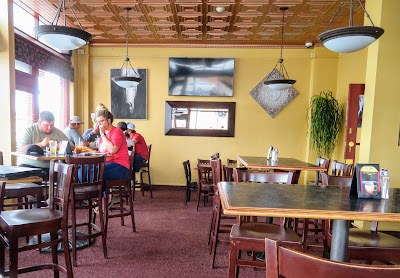…continuing with our road trip last July through western Nebraska. Only 2 more posts including this one and our adventures in Nebraska will come to an end.
Moving north from Stapleton along US Hwy 83 in Logan County, we stopped to take a few photos of the local residents. A couple of them appeared curious…staring right back as us. They probably don’t see that many humans. Counting all cattle in the state, including those in feedlots, there are an estimated 6,850,000 of them…vs only 1,960,000 of us, and most of the humans are focused in Omaha and Lincoln.
FYI, if
you think that ranch life is something that you would enjoy, Logan County
currently has 3 ranches up for sale.
They go from a mere 1,786 acres for $4,450,000 on up to 6,113 acres for
just $7,000,000.
Just after crossing into Thomas County Nebraska…still headed north…we crossed over the scenic Dismal River. The legend is that this river got its name with a school teacher tried to ride her horse across the river during the winter and she drowned.
The
Dismal River is only about 80 miles long but it is the state’s wildest and most
undeveloped river. It has been
identified by the US Park Service as worthy of designation in the National Wild
and Scenic Rivers System. The water in
this river originates from water welling up from springs in the Ogallala
Acquifer…that vast underground reservoir that extends all the way down to Northern
Texas.
The
Dismal River is flanked by private cattle ranches and has been since the
1880s. Some of the springs along the
river emit water at such a fast rate that they seem to ‘boil’ out of the
ground. Some of the springs are more
than 100 feet deep and quick sand is found near some of them.
The town of Thedford Nebraska was our northernmost point on this portion of our drive. Thedford is a village and the county seat of Thomas County. Like almost every other town in western Nebraska, this village was established when the railroad came to town. That happened in 1887 with the arrival of the Chicago, Burlington and Quincy Railroad. Thedford was probably named after Thedford Ontario, Canada. The town has never had a population of more than 313 (1980) and today it has 219 residents.
I took a photo of the old “Cowpoke Hotel” in Thedford. While I couldn’t find out anything about the building itself, I did come across a 2002 Nebraska Historic Building Survey that noted structures along the state’s historic highways. The Cowpoke Hotel was listed as a place worthy of listing as an historic structure. I also found older photos that showed the old hotel with a couple big shade trees right in front of the building. The stumps are still there…
Thomas
County covers 714 square miles and it has about 725 residents. It has never had more than 1,773…and that was
in 1920. The county was named for
General George H. Thomas. Thomas (1816 –
1870) was a Union General in the Civil War and was one of the principal
commanders in the Western Theater.
Despite his many victories and military successes, he is not widely
known today. To learn more about this
Unionist from Virginia, just go to https://en.wikipedia.org/wiki/George_Henry_Thomas.
When Laurie spotted this statue of two young girls in Thedford, we had to stop and see what it was all about. On May 10, 1881, 8-year-old Matilda Haumann and her 4-year-old sister Anna, became lost in the Sandhills while returning home from visiting their sister who was helping a neighbor. Their parents, Carl and Henrietta, reported the girls missing on May 11 and search parties were organized. Three days later, searchers found Anna 25 miles from her parent’s house. She was suffering from dehydration and exposure but recovered. Scores of other searchers joined the effort and on Sunday, May 17th, they found Matilda’s body. She had walked 75 miles in her effort to find help before collapsing.
This
monument to the girl’s bravery and to the challenges faced by new settlers in
the Sandhills was dedicated on May 1, 2016.
Six generations of the Haumann family were present for the ceremony…
From Thedford, we headed southeast along NE Hwy 2, also referred to as the Potash Road. The highway got its name from the potash industry which thrived in the western part of Nebraska prior to World War I. NW Hwy 2 is considered to be one of the most scenic roads in the state.
We just
had to stop and take a couple photos of this great looking herd of horses… A
couple of them seemed pretty interested in Laurie too.
The next town we stopped in was Merna Nebraska…about 50 miles from Thedford. This is the Brenizer Library at 205 North Walnut Street. It was completed in 1917. The funds for the library ($6,500) were donated by homesteader James G. Brenizer and the building was designed in the Prairie School and Classical Revival styles. It’s been listed on the National Register of Historic Places since 2007.
This
library has been in continuous service since 1917 and only had 8 librarians
from 1917 through 2007. An assembly room
on the lower floor is used regularly by the Women’s Club, Legion Auxiliary,
American Legion, Campfire Girls and others.
Both Mr. Brenizer and an heir have allowed for additional funding…
This pleasant looking home is the Benjamin and Mary Kellenbarger House at 451 West Center Street in Merna. This home is a well preserved example of residential Queen Anne architecture…a style that was popular from about 1880 – 1910. The home is listed on the National Register.
When the
railroad reached Merna in 1886, the railroad’s Lincoln Land Company platted the
town and sold lots that same year. By
March of 1890, the town had 200 residents, 2 banks, 2 hotels, 3 general stores
and cafes, 3 livery stables, a billiard parlor and a meat market. The Merna Opera House opened in 1900 and by
1904 the town’s newspaper boasted that “only two sod houses remained in the
town proper”.
Today,
Merna has an estimated population of 363.
FYI, the town was named in honor of the town’s first postmaster’s
daughter.
Just a few miles southeast of Merna, we came to Broken Arrow Nebraska. This town with roughly 3,500 residents is the county seat of Custer County. Broken Bow was located and platted in June of 1882. The name was suggested to the post office department by a local who found a broken bow on an old American Indian camping ground that was located in the area. No one knows who the owner of the bow was nor any other related facts in that regard…but a fragment still exists.
Downtown
Broken Bow has been designated as a Historic District on the National
Register. The 2-story George W. Smith
Building at 845 South “D” Street was built in the Italianate style. The “District” contains a large collection of
late 19th and early to mid-20th century commercial
buildings. As the photo shows, some
refurbishing appears to have been recently completed…
The 2-story Italianate style Union Block Building is the oldest structure in the historic district. Located at 430 – 444 South Eighth Stree, it was built in 1887. I love all the detail along the top of this building but it is a shame that the windows on the second level are all boarded up. It needs a serious bit of restoration…
This is the Neo-Classical style Custer County Courthouse and Jail in Broken Bow. It was built in 1911 and it is listed on the National Register of Historic Places. The courthouse cost $75,000 to build and it was one of the earliest fireproof structures in Nebraska. The previous courth0use had burned down…
Custer
County was formed in 1887. It covers
2,592 square miles, about double the size of the State of Rhode Island. The county was named after General George
Armstrong Custer…who was killed in the Battle of Little Bighorn. Much of the county’s early history revolved
around the classic struggle between ranchers/cowboys and the farmers who moved
into the area. By 1894, the county had
over 250,000 acres under cultivation and 1,000,000 cattle plus 75,000 hogs
within its borders. Unfortunately, that
year also brought a severe drought with livestock selling for almost nothing
and farms being almost given away. Today
Custer County is second in the USA for the number of beef cattle on the range… Back in 1920, there were 25,668 residents in
the county but today there are only about 10,800.
It was time for lunch and we chose the Bonfire Grill – Restaurant and Pub that is located in the Arrow Hotel. This Prairie School style hotel was built in 1928. Originally the hotel had 53 guest rooms and the first floor was occupied by 2 stores, a barber shop, the hotel lobby (shown above), dining room, kitchen and a beauty parlor. One of the reasons for the hotel’s listing on the National Register is that it played such a significant role in the town’s history…an important building in the rural sandhills area.
We happened to arrive in Broken Bow and the Bonfire Grill right after a power outage knocked out much of the town’s electricity. Fortunately power was restored shortly after our arrival so we were able to order our meals. In addition to the small bar and pub with its dining area, in my wanderings through the first floor of the hotel I did see a more formal dining venue.
It was lunchtime so we kept it simple. Laurie had the Classic Bacon, Lettuce and Tomato Sandwich with mayonnaise. ($12.00) I ordered the Club Sandwich with turkey, bacon, cheese, tomato, lettuce and mayonnaise. ($15.00) Both sandwiches came on marbled rye bread but Laurie opted for white toast. For our sides, we both ordered their ‘Buffalo Chips’. The sandwiches were very competent with quality ingredients. To see this restaurant’s menu, just go to https://www.arrowhotel.com/dining-1.
The Arrow
Hotel is allegedly haunted…with many reports of paranormal activity. Staff has reportedly seen a grey-haired man
walking around the building at night as well as a ghostly man sitting in the
cigar room. In addition there have been
reports of heated arguments in one corner of the building as well as the voices
of children laughing and playing…accompanied by cold chills!
Today the
Arrow Hotel is listed as a 24-room historic boutique hotel. FYI, the AAA rate for a King Room for this
week was $125.00 plus taxes. To learn
more about the hotel, go to https://www.arrowhotel.com/.
Just
click on any of the photos to enlarge them…
Thanks
for stopping by for a visit!
Take Care,
Big Daddy Dave



















Those are some happy cows and the horses are so beautiful. Now I am off to the kitchen to make myself some sandwiches with lots bacon!!
ReplyDeleteI think the only way the average person can acquire agriculture land is to inherit it.
ReplyDelete